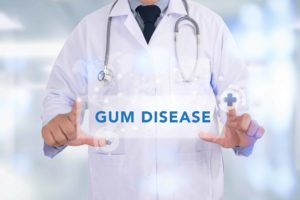
Even if you aren’t currently undergoing treatment to control gum disease, it might still be an impending threat to your oral health. As one of the most frequently-experienced dental issues, gum disease can affect nearly anyone at some point in their lives. Without proper care and maintenance, and a healthy understanding of its causes and effects, you might not be well-enough equipped to protect your smile in the long-run. To improve your chances, we explore some of the more worrisome truths about gum disease, and the influence it can have on more than just your gums.
You May Not Notice It at First
When a tooth is infected with decay, increasing sensitivity (and sometimes, tooth discoloration) can warn you of its presence fairly early. By contrast, the early symptoms of gum disease aren’t necessarily as prominent, and are often ignored or not recognized as signs of an infection. Routine checkups and cleanings can allow your dentist the chance to spot the disease before it becomes a serious issue. But, if you skip your appointments, then you might not realize you have gum disease until severe damage occurs.
It Can Affect Your Teeth, Too
Since it’s commonly called gum disease, it might come as no surprise that it mainly affects the soft gum tissues surrounding the bottoms (roots) of your teeth. However, the damage caused by progressing gum disease can surpass your periodontal tissues and eventually reach the jawbone underneath them. Left untreated, the infection will erode your jawbone, which supports and sustains your teeth roots, eventually leading to the loss of one or more of your adult teeth.
Gum disease causes the loss of bone that hold the teeth. If the gum disease gets too advanced, then the question arises if you can even have implants with your gum disease.
Gum Disease Can Lead to Other Diseases
The main cause behind the destruction that gum disease wreaks on your teeth and gums is inflammation, or swelling of your gums. Inflammation is a natural immune response designed to rid your body’s tissues of harmful micro-organisms. In the case of gum disease, certain oral bacteria can manipulate this reaction, causing unchecked swelling and substantial damage to your gums. If oral bacteria enter your bloodstream through compromised oral tissues, then they can also incite inflammation in other areas of your body, exacerbating your risks of chronic inflammatory diseases like;
- heart disease
- rheumatoid arthritis
- dementia
- diabetes
- and more
Learn More About Gum Disease
To learn more about why you should worry about gum disease, call us today at 847-234-0517. We also proudly serve residents of Chicago and all surrounding communities.
